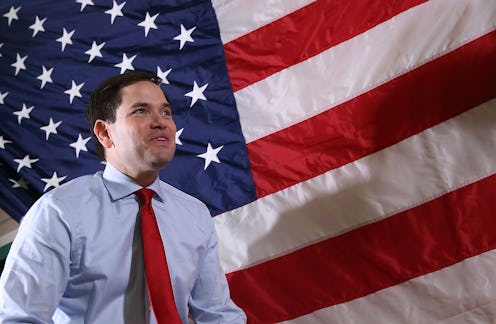News
Marco Rubio Knows Exactly What He's Doing
In his first interview since withdrawing from the Republican race, Marco Rubio confirmed that he won't run for reelection in the Senate, nor will he seek Florida governorship in 2018. He's not interested in the vice presidency, either. The Florida senator appeared sad and somewhat tearful during the interview, but don't feel bad for him: Rubio has been opportunistic throughout his short career, and his decision to not run for office anytime soon is most likely a calculated effort to position himself for the presidency again in 2020.
"I’m not gonna be anybody’s Vice President," Rubio said Wednesday. "I’m not gonna be Vice President. I’m not running for Governor of Florida. I’m gonna finish out my term in the Senate and over the next ten months we are going to work really hard here — we have some things we want to achieve — and then I’ll be a private citizen in January."
By all accounts, Rubio is ambitious, impatient and anxious to ascend the ranks of elected office. This tendency of his was documented at length in McKay Coppins' The Wilderness, but it's been reported elsewhere as well, and in order to fuel his swift political rise, Rubio has gone to extreme lengths to do so.
A couple of examples...
- Rubio ran for the Florida House of Representatives in 2000, and didn't even live in the district that he ran to represent. When he ran for Speaker of the House in Florida years later, he reportedly traded away school funds for his district in order to secure support from rival lawmakers (Rubio denies this).
- In 2010, he ran an insurgent Senate campaign against incumbent Republican Governor Charlie Crist, who was also seeking the office. This intra-Republican feud created a headache for the GOP in an otherwise winnable race. It ultimately resulted in Crist switching parties, becoming a Democrat and campaigning for President Obama in 2012.
- During his 2010 Senate run, Rubio received significant encouragement and support from former Governor Jeb Bush, a longstanding titan in the Florida political scene. When Bush decided to run for president in 2015, Rubio, despite having served less than a single term in the U.S. Senate, challenged his former mentor for the nomination. He did this against the advice of many Florida Republicans.
- In the Senate, Rubio defied Republican leadership by voting against the 2011 debt ceiling bill and the 2013 budget deal. Not long thereafter, he pursued immigration reform against the wishes of many GOP party elders.
Rubio had actually announced a while back that he wouldn't be running for reelection to the Senate in 2016. According to a longtime friend of his, Rubio simply hates being a senator, which may be why he's missed so many votes. As for his decision not to run for governor in 2018, that might be because, according to a separate report in Politico, his team is already preparing his 2020 presidential run.
So sure, be sympathetic towards Rubio, because losing is never easy for anyone. But don't be too sympathetic.
